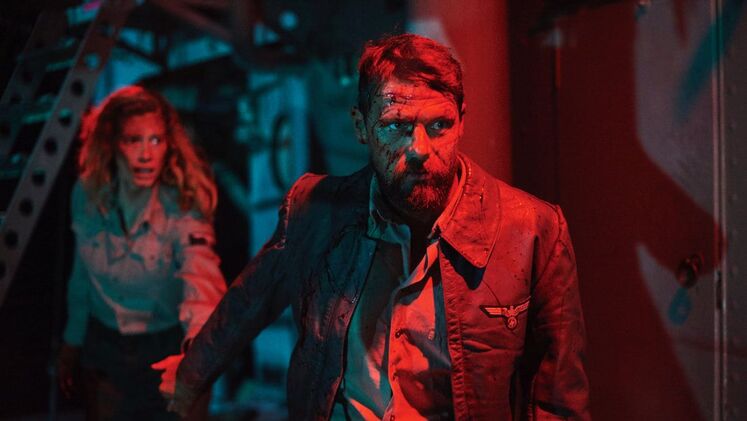 There's stranded at sea, and then there's stranded at sea in a boat full of Nazi vampires... ...Directed and co-written by Justin Dix, Blood Vessel is an enjoyable blend of World War II drama and single-location vampiric horror. After surviving a Nazi U-boat attack on their hospital ship, eight Allied soldiers find themselves stranded aboard a lifeboat. As their rations run out and tensions boil, a towering vessel approaches. Their joy at being saved is short-lived, however, as they discover their would-be savior is a Nazi ship. With no other option, our survivors reluctantly board the ship, though they quickly learn they would have been better off starving. Once aboard, they realize the ship is not as abandoned as it first appeared. They spot signs of a struggle and stumble upon a mauled Nazi’s corpse with strange roots sprouting from it. Further investigation leads them to discover that the ship was home to the Nazi's paranormal division, and an ancient evil slumbers within its hull. From the film’s opening moments, it’s apparent that Justin Dix has spared little expense in bringing Blood Vessel to life. From scenic exterior shots of the ship to claustrophobic and brooding atmospheric interiors, Blood Vessel's immaculate presentation knows how to fully engross its viewer in stranded-at-sea atmosphere. Beyond a stunning setting, Blood Vessel also showcases some wonderfully decrepit vampiric practical effects. The Allies’ investigation unearths an ancient Matriarch (Vivienne Perry) and Patriarch (Troy Larkin), who both hunt and use their supernatural influence to turn the survivors against one another. Dix and co-writer Jordan Prosser's handling of Blood Vessel's scares clicked for me in a way I didn't expect. Rather than have the vampires jump from the shadows and feast on human necks ad nauseam (don't worry, there's some of that), the focus is directed towards psychological scares. We learn that the vampires bite allows them to control their victim, bending them to their will. Thus, an extra layer of paranoia and fear sets in among the survivors as the Matriarch and Patriarch begin to take their victims. There are several instances where the Matriarch controls a bitten survivor, forcing them to attack other survivors. In another scene, the Patriarch causes a soldier to hallucinate that he is seeing his wife who he misses dearly. This paranoia-inducing variation on the effects of vampire bites makes for more memorably creative scares, rather than a handful of generic vampire moments. The vampires’ decision to focus on destabilizing the survivors perfectly ties into the film's unique narrative. Blood Vessel provides a variety of representation that often eludes war films. The diversity extends beyond nationalities of the Allied survivors—American, Australian, British, and Russian—to include minority and female characters. This break from the generic soldier template allows for deeper exploration of their relationships and adds a layer of tension to the already unique circumstances. Just because these survivors are Allies doesn't mean they don't hold preconceived notions about one another. Their unease and distrust of each other elevates the narrative to beyond your generic soldier banter. Instead, the complicated relationship of the survivors forces them to rally together to face a common threat more dangerous than themselves. Within the chaos, their camaraderie will be their savior. Of the eight survivors, the most memorable performances come from Russian sniper Teplov (Alex Cooke), Australian soldier Sinclair (Nathan Phillips), and British nurse Jane Prescott (Alyssa Sutherland). These characters are defined by their persistence in overcoming their grief from events caused by the war. In humanizing these characters, Dix and Prosser allow the viewer to easily root for them to both survive their vampiric foes and find redemption. For as much as I enjoy Blood Vessel, it takes its time to build up to its vampiric reveal. There's a portion early on, when the survivors are investigating the ship, that feels a little drawn out, as characters repeatedly revisit rooms, struggling to find answers to their questions. Fortunately, this passes in favor of vampiric carnage with a bold and bloody payoff. Whether it’s facing off with the Matriarch or a horde of Nazi vampires, Blood Vessel recovers well from its early pacing stumble. Blood Vessel doesn't feel like your average indie horror film attempting to blend the genre with historical fiction. A purposefully unique mixture of wartime perspectives provides an engaging narrative that compliments its strong production polish. Pairing this with bloody great practical effects makes the film a summer horror standout. Blood Vessel arrives on VOD July 21st from The Horror Collective. By Jay Krieger
0 Comments
Leave a Reply. |
Archives
March 2023
|


 RSS Feed
RSS Feed